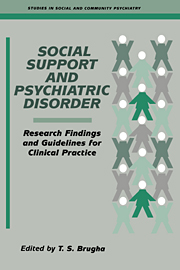Book contents
- Frontmatter
- Contents
- Preface
- List of contributors
- 1 Social support and psychiatric disorder: overview of evidence
- PART I CONCEPTS AND ORIGINS OF SOCIAL SUPPORT
- PART II LESSONS FROM SELECTED OBSERVATIONAL STUDIES
- PART III LESSONS FROM INTERVENTION STUDIES
- 9 Social network and mental health: an intervention study
- 10 A test of the social support hypothesis
- 11 Case management and network enhancement of the long-term mentally ill
- 12 Expressed Emotion: measurement, intervention and training issues
- PART IV INTERVENTION PRINCIPLES AND RECOMMENDATIONS
- Index
11 - Case management and network enhancement of the long-term mentally ill
from PART III - LESSONS FROM INTERVENTION STUDIES
Published online by Cambridge University Press: 31 October 2009
- Frontmatter
- Contents
- Preface
- List of contributors
- 1 Social support and psychiatric disorder: overview of evidence
- PART I CONCEPTS AND ORIGINS OF SOCIAL SUPPORT
- PART II LESSONS FROM SELECTED OBSERVATIONAL STUDIES
- PART III LESSONS FROM INTERVENTION STUDIES
- 9 Social network and mental health: an intervention study
- 10 A test of the social support hypothesis
- 11 Case management and network enhancement of the long-term mentally ill
- 12 Expressed Emotion: measurement, intervention and training issues
- PART IV INTERVENTION PRINCIPLES AND RECOMMENDATIONS
- Index
Summary
Introduction
Are people largely architects of their own social environments, as Henderson has suggested (1992)? In this chapter we shall pursue this issue by developing two arguments: first that a complex pattern of factors influences the social networks of people with severely disabling mental illnesses, and second that such networks may be enhanced through careful case management approaches to treatment. If this is so, why enhance such networks? Such enhancement may be important for three reasons: to improve the availability of practical support from other people, to improve patients' views of their own quality of life, and to contribute towards alleviation of their affective symptoms. Where social support resources are insufficient, staff may need to implement a prosthetic network of professional and voluntary services (Harris & Bergman, 1988).
In this chapter we shall outline the policy background for the care of the seriously mentally ill in the United States, and examine the definitions and practices of case management and its variants. Further, we shall describe in detail a 2 year follow-up study of the social networks of long-term psychiatric patients under the care of the COSTAR programme in Baltimore, Maryland, a mobile treatment service for the severely mentally ill; and we shall report the results of an evaluation of patient outcome in relation to duration of contact with the programme, and discuss the hypotheses generated by these results.
There has been considerable research interest in the quality of life, problems of homelessness, organisation of services, use of case managers, financial resource allocation, and governmental policy towards this patient group.
Keywords
- Type
- Chapter
- Information
- Social Support and Psychiatric DisorderResearch Findings and Guidelines for Clinical Practice, pp. 239 - 256Publisher: Cambridge University PressPrint publication year: 1995
- 2
- Cited by

